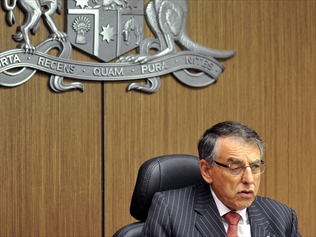
The former head of the NSW anti-corruption agency has denied he was ever responsible for ensuring professional standards of conduct were adhered to by the barristers who worked for the agency as counsel assisting. David Ipp has told the NSW Supreme Court that it was not part of his duties, when he was head of the Independent Commission Against Corruption, to ensure that counsel assisting complied at all times with the rules governing the professional conduct of barristers. Mr Ipp, who is now retired, also rejected the suggestion that the ICAC Act contained an implied requirement that commissioners should take reasonable steps to ensure that counsel assisting complied with that statute.
His views are outlined in his defence to civil litigation that accuses him of misfeasance in public office when ICAC was investigating former state politician Eddie Obeid and his family. As well as Mr Obeid, the plaintiffs in the case are his sons Eddie Obeid Jr, Moses Obeid and Paul Obeid. Their legal action is directed at Mr Ipp, ICAC, the state of NSW, the commission’s former counsel assisting, Geoffrey Watson SC and ICAC officers Grant Lockley, Paul Grainger and Darren Curd. Mr Ipp’s defence, which was filed in the Supreme Court on Tuesday, is the latest step in an attempt by Mr Obeid and his family to have the Supreme Court declare that ICAC’s report from an inquiry known as Operation Jasper was not made according to law and is a nullity. Mr Ipp and the other respondents have denied liability.
Mr Obeid and his family have accused the commission of mishandling evidence and of suppressing exculpatory material that could have been used to challenge the credibility of certain witnesses. Mr Ipp’s defence shows that he denies an assertion in the Obeids’s amended statement of claim that he was under a duty to ensure all “competing information” available to the commission concerning an unresolved issue of fact was tendered at any public inquiry and made available to the affected parties. Mr Ipp also denied that when competing information was before the commission he was required “to the extent that he considers it necessary” to order a further investigation and to review the results. On all those points, the denials contained in Mr Ipp’s defence are mirrored by equivalent denials in the defence that was filed on February 12 by ICAC.
ICAC also has denied entering “a contract, agreement or understanding” in which it agreed not to make adverse findings against a witness, Gardner Brook, who gave evidence that helped the commission make findings. ICAC’s defence says that witnesses are entitled to reasonable expenses, including loss of wages and reasonable costs in getting to and from ICAC. Mr Ipp’s defence says Mr Brook was ordinarily resident in Singapore at the time and ICAC had paid for his travel, food and accommodation. The amended statement of claim says Mr Ipp made no adverse findings against Mr Brook. He also issued a suppression order preventing publication of a statement that says: “Gardner had a very serious cocaine habit and I inevitably ended up paying for his supply of this contraband substance.” The amended statement of claim reveals that Mr Obeid senior complained ICAC had issued a press release on August 7, 2012, announcing a public inquiry concerning Mr Obeid before giving him the opportunity to give exculpatory evidence at a private compulsory examination. It says Mr Obeid complained on or about August 7 and later was served with a summons to attend a compulsory examination. The Obeids assert that the summons was dated July 23 and was served on August 14. Other summonses dated July 23 were served on Moses and Paul Obeid on August 17, the amended statement of claim says.
However, ICAC’s defence says all of the summonses were served on or about July 24, one day after they were issued and before the August 7 press release. The Obeids state that the incident means Mr Ipp had already formed a preliminary view about the credibility of some witnesses on the day the press release was issued and this meant they had been denied procedural fairness. However, ICAC’s defence says the commission can conduct a public inquiry only if it has already formed a provisional view about the credibility of some of the witnesses . The commission denies the Obeids were denied procedural fairness.
CHRIS MERRITT
LEGAL AFFAIRS EDITOR, THE AUSTRALIAN. (WTF- used with permission)
